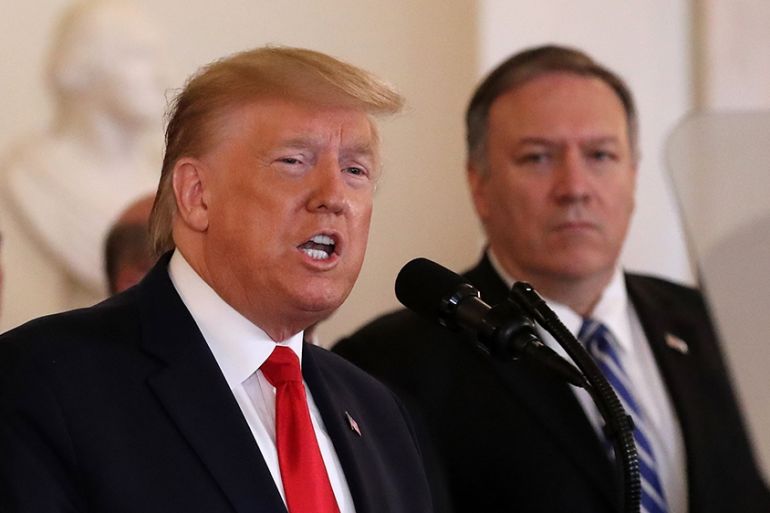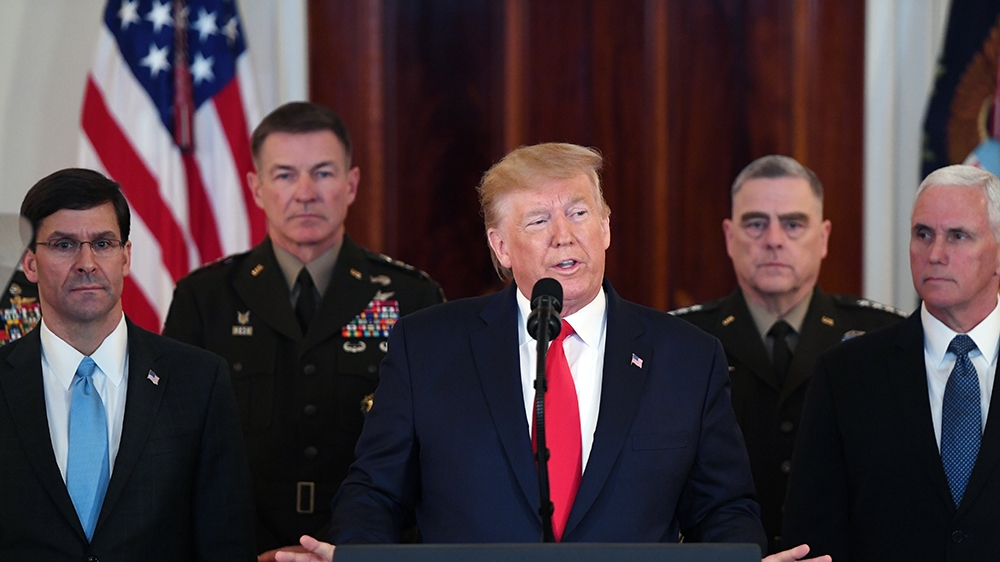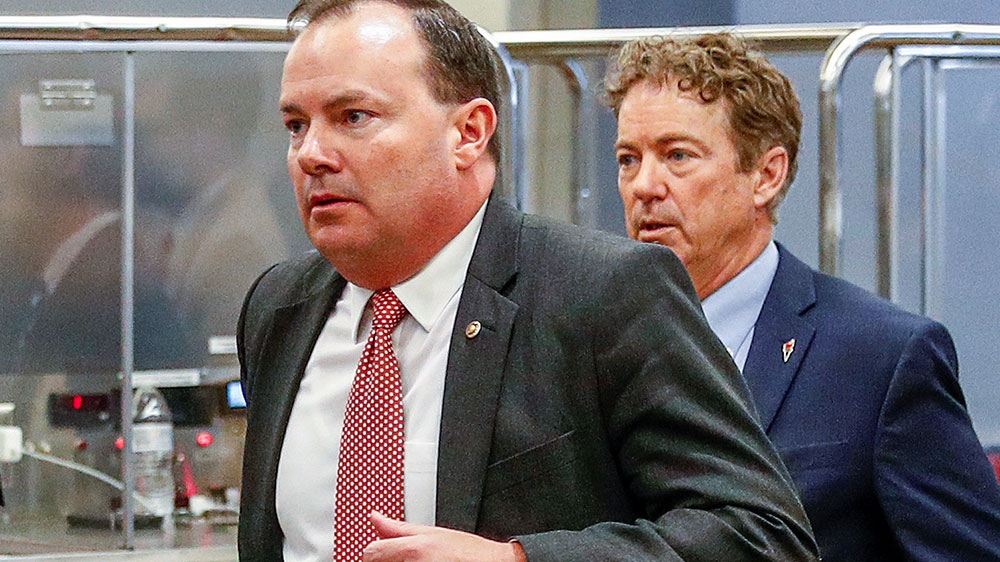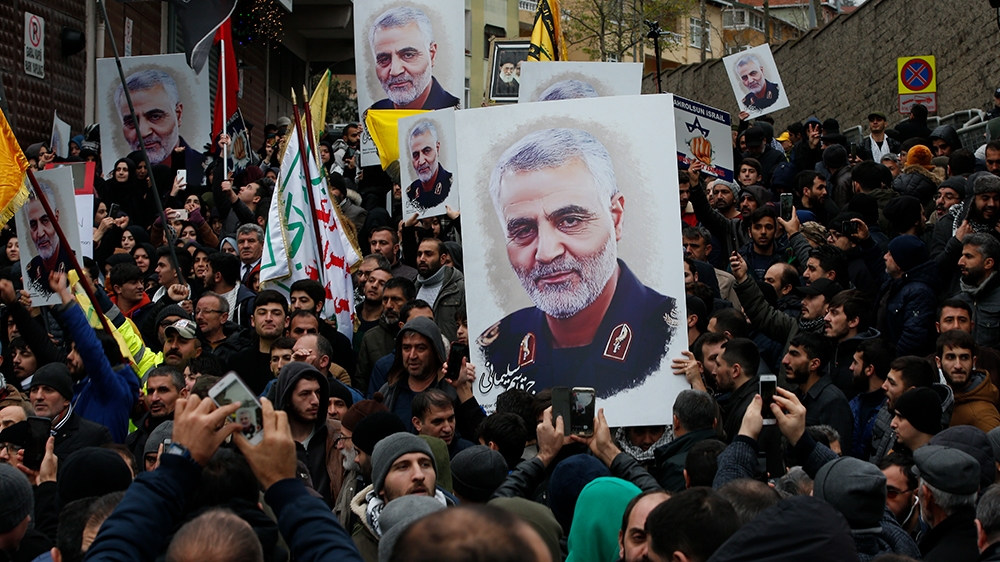US House to vote on limiting Trump’s actions against Iran
Democrat-controlled House expected to pass War Powers resolution, but similar resolution faces uphill battle in Senate.

Washington, DC – Alarmed by US President Donald Trump‘s escalation with Iran, Democrats in the House of Representatives on Thursday are expected to approve a resolution aimed at limiting the president’s ability to attack Iran in the future without congressional approval.
“Members of Congress have serious, urgent concerns about the administration’s decision to engage in hostilities against Iran and about its lack of strategy moving forward. Our concerns were not addressed by the president’s insufficient War Powers Act notification and by the administration’s briefing today,” House Speaker Nancy Pelosi said on Wednesday when announcing the vote.
Keep reading
list of 3 itemsUS-Iran tensions: What war powers does Trump have?
Iran warns of ‘dangerous response’ if US attacks again
The House War Powers resolution would direct Trump to terminate military operations against Iran. A similar version is expected to be debated in the Senate.
Thursday’s expected House vote follows days of frustration by Democrats over Trump’s order to kill Iranian military leader Qassem Soleimani in Iraq. Congress was not consulted prior to the assassination. Iran responded with attacks against Iraqi bases housing US troops. Trump said on Wednesday there were no US or Iraqi casualties.
In its justification for the killing, the Trump administration said Soleimani, who led Iran’s elite Quds Force, was planning an “imminent” attack on US forces in Iraq. Democrats are angry they were not consulted before the attack on Soleimani.

Under the US Constitution, the authority to direct military action is divided between Congress and the president. Congress has the power to declare war while the president, as commander-in-chief, has the power to use the military to defend the US.
Trump on Wednesday took to Twitter to urge Republicans to vote against the House’s resolution.
House Democrats who were briefed on Wednesday by Trump administration officials on Soleimani’s killing, slammed the president, calling the briefing “sophomoric and utterly unconvincing”.
“I believe this administration is, after the fact, trying to piece together a rationale for its action that was impulsive, reckless and put this country’s national security at risk,” Democratic Representative Gerry Connolly told reporters.
But Republicans in the House offered a different version of how the briefing went.
“Not only did the president make the right call but this was a clear and present danger for American interests and American individuals,” said Representative Mark Meadows, one of Trump’s top Republican allies in the House of Representatives.
The War Powers resolution is expected to pass in the House. The Senate will debate a similar measure with at least two Republicans signalling they will join Democrats in rebuking the president on Iran.
Uphill battle in Senate
Senators left a separate briefing on Wednesday, with Democrats complaining it ended without all questions be asked.
Most Republican senators defended the president, but Senators Rand Paul and Mike Lee railed against Trump and his team.
It was “probably the worst briefing I’ve seen on a military issue in the nine years I’ve been in the United States Senate,” Lee told reporters.

Lee and Paul signalled they will join Democrats to vote to limit Trump’s authority to order additional military action against Iran.
But the effect of the congressional votes on any War Powers resolution will be largely symbolic and political, said Lawrence Korb, a national security analyst at the Center for American Progress in Washington, DC. So long as Trump retains the support of most of the 53 Republicans in the Senate, Trump can veto the measure.
Without “a whole defection of Republicans” in support of limiting the president’s war powers, decisions to escalate against Iran will rest with the president and his advisers, Korb told Al Jazeera.
In Senate remarks on Tuesday, Majority Leader Mitch McConnell, a Republican, recounted a litany of hostilities between the United States and Iran going back to 1979 and the beginnings of the Islamic revolution.
“We should all remember that the history of Iranian aggression began long, long ago,” McConnell said.
“The question is whether we would prefer the administration standby as Iran kills Americans or whether we’re prepared to work with the president to stand up to Iran’s terrorism and shadow wars,” he said.
‘Really up to Trump’
Trump has said he does not want a war with Iran and despite his blustering rhetoric and tweets, the president has shown an aversion to engaging in military conflict.
Following the attacks on US forces, Trump said it appeared Iran was “standing down”.
With the United States and Iran retreating – for now – from the precipice of war, the next steps are “really up to Trump,” Korb said.
A Trump veto would mean supporters of the resolution would need to muster two-thirds majorities in both the House and Senate to prevail. That appears unlikely for now.

Nevertheless, Democratic concern about Trump’s seemingly erratic handling of Iran runs deep and is likely to be reflected in the upcoming votes.
Further, Republican senators “are privately very concerned about this president’s behaviour, but that has not translated into public concern and it probably won’t over the course of this crisis with Iran,” Democratic Senator Chris Murphy told Al Jazeera.
The congressional resolutions are being brought forward under the War Powers Act of 1973 and would mark the second time in Trump’s presidency Congress has voted against deepening US military engagement in the Middle East.
Last year, Congress rebuked Trump’s authorisation of US military support for Saudi-UAE campaign in Yemen, including aerial refuelling of combat aircraft and supplies of precision munitions that were used to kill civilians.
In April 2019, the House approved a War Powers resolution on a 247-175 vote that would have blocked US military engagement in Yemen. The Senate voted 54-46 to approve the measure.
It was the first time in 47 years that Congress had invoked its constitutional authority to try to stop US involvement in a foreign conflict.
Trump vetoed the Yemen bill and Congress did not rally two-thirds majorities needed to override the president.